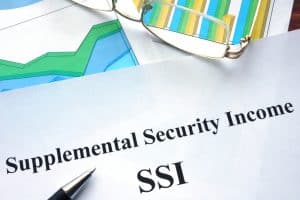
Both Social Security Disability Insurance (SSDI) and Supplemental Security Income (SSI) offer cash benefits, paid monthly. Some people believe they must use their disability payments to cover the direct costs of a disability, including treating their health condition or living with their impairment. This is a myth, as you can use them to help pay for utilities, heating costs, or rent.
However, many people do have prescription drug costs and other health care costs to consider in addition to utilities. If you find yourself in this situation and you are struggling to make ends meet, there may be help available through other programs that provide money specifically for medical care, utilities, heating costs, and rent.
How Do You Qualify for Help With Your Medical Expenses?
The type of SSD benefits you receive can affect the financial help you get with your medical expenses:
Social Security Disability Insurance
To qualify for Social Security Disability Insurance (SSDI) benefits you must have worked in a job where you paid Social Security taxes and you have a disability that will keep you from working for a minimum of 12 month or result in death.
People who are awarded SSDI benefits qualify for Medicare after a 24 month qualifying period.
Supplemental Security Income
To qualify for SSI you must meet specific low income requirements and have a disability that will keep you from working for a minimum of 12 months or result in death. SSI is a program for those with extremely low incomes and few assets. Per the SSA, in 2022, the maximum monthly payment you can receive for SSI is $841.
In most states, those who qualify for SSI benefits automatically get Medicaid benefits to cover their medical needs. They may also meet the requirements for other federal, state, municipal, or non-profit assistance programs.
40+ years of experience from strong, knowledgeable, compassionate attorneys.
Start A Free EvaluationAre There Programs to Help You Pay Utilities, Rent, and Other Necessary Costs?
While having Medicare or Medicaid to cover many of your medical needs leaves more money for other expenses, it can still be difficult to make ends meet when you cannot work. There are several other federal, state, and local programs that can help you pay for housing, food, and utilities.
Housing Assistance
In the Pittsburgh area, the Allegheny County Housing Authority and the Housing Authority of the City of Pittsburgh operate and allocate funds for two programs that help low-income families pay their rent:
- Low-income public housing; and
- The Housing Choice Voucher Program (HCVP)
Low-income public housing offers placement in government-owned and subsidized housing projects. The HCVP, sometimes called Section 8 housing, offers help paying the rent for families living in poverty, as well as the elderly and those with impairments that prevent them from working. While low-income public housing offers subsidized rent in a housing project, HCVP provides extra money to pay the rent for private units available for subsidized housing.
To qualify for housing assistance, you will need to meet strict eligibility requirements that include:
- Having a qualifying family status;
- Meeting income and asset limits;
- Having a qualifying citizenship status; and
- Not having a history of some types of convictions, such as drug-related crimes.
Food and Other Necessities
If you qualify for SSI or receive SSDI and have a low income, you may also qualify for help from the Supplemental Nutrition Assistance Program (SNAP). SNAP, or “food stamps,” allows seniors, those with disabilities, and other low-income households to buy certain foods and other supplies at local grocery stores and supermarkets. Approved recipients have money loaded onto a prepaid card each month.
To qualify for SNAP, your household income must meet strict requirements. You may be eligible with a higher income if you have childcare payments, housing costs, medical expenses, or other similar costs.
If you do not qualify for SNAP but need immediate help with food, several local non-profits operate food banks that can provide non-perishable food items for you and your family.
Utilities
There are several things your local utility company could do to ensure your bill gets paid every month. It can help make your home more energy-efficient, put you on budget billing so that your bill is the same every month, or offer a payment plan. Some may have other programs to help low-income families, as well.
The Low-Income Home Energy Assistance Program (LIHEAP) also offers help with utility payments to extremely low-income families. By helping with gas or electric bills, this program can help you pay for heating costs during the winter. The U.S. Department of Health and Human Services funds LIHEAP, while local offices administer the program.
We know you’re hurting. We can help. Free case evaluations, home and hospital visits.
Contact Us Now For HelpHow a Social Security Disability Lawyer on Our Team Can Assist You
If you have questions about getting disability or need help fighting a denial, our team is here for you. When you retain our legal services, our attorneys will:
- Explore your options for disability benefits and determine which ones you can pursue
- File your application to ensure it is complete and accurate
- Track the progress of your disability claim
- Answer any of your questions throughout the claims process
If your claim is denied, we can represent you during the appeals process, which can consists of four stages:
- Reconsideration
- Administrative Law Judge (ALJ) hearing
- A review in front of the Appeals Council
- A review in front of Federal Court
Note that you won’t necessarily have to go through all these stages to obtain benefits, as the Social Security Administration (SSA) can approve your claim at any time. You may get backpay for the payments you didn’t receive from the time you were applied to the time you get your first check.
You need an attorney with the experience and dedication to give your case the care it deserves.
Start A Free EvaluationGet Help With Your SSI or Disability Claim With Berger and Green Today
You can use disability benefits from SSI or Disability to pay for some of the costs you face each day. However, it may not be enough, so you can look for extra financial relief for utilities, heating costs, and rent elsewhere.
For more information, call Berger and Green today at(412) 661-1400. We offer free case consultations, can look over your claim before you submit it, and will handle your appeal on a contingency-fee basis.









